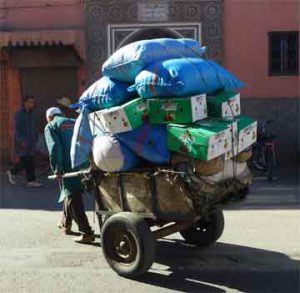
ONE DAY as I was having a cup of tea outside a small hotel in Istanbul, I noticed that the street was named Dervishlersokak, which means “alley of the dervishes.” At that very moment, a man pulling a cart stacked high with sacks of chickpeas passed by, a single man carrying the kind of burden one only sees in cities of the East like this. I don’t know why, but all at once the idea occurred to me that while many people identify as Sufis, to be a dervish is something more. A dervish is someone who has willingly yoked themselves to the wagon of servanthood and taken on the great responsibility of spiritual practice.
The Prophet, peace be upon him, said: “How wonderful is the condition of a believer for everything that befalls him is good.” He then explained: “If he is touched by fortune, he is grateful and it is good for him. If he is touched by evil, he is patient and it is good for him!” One could also say, “How wonderful and joyous is the condition of the dervish, for every circumstance and event of life is received as a lesson in the school of love.”
In our time, without the support systems of the past, dervishood becomes more than ever an intention, a heroic way of being, an inner sense of purpose.
Dervishhood develops out of love—a love which is the unity of the human lover and the divine beloved. When two people fall in love, that love is the unity and consent of two hearts. When the clean heart of the dervish is opened to Spirit, the eternal power of Love is experienced. We do not create this love or command it; it appears spontaneously when we have cleared our hearts.
We associate the word dervish with certain generous and courageous qualities. These are qualities that go beyond labels, beliefs, and identifications. There is a place for intellectual formulations and metaphysical systems, but these are weak structures without a sincere and courageous heart. In fact, a dervish could be quite silent about these things and nevertheless live as a consummate dervish. In the end, we must give the greatest value to a sincerity that results in wise, generous, and courageous action done for its own sake without expectation of any reward.
Intellectuals may discuss and contend over issues of metaphysical distinctions, or the proper form of religious observances, or the meanings of words. But a dervish lives in the light of a truth of certainty, Haqq al Yaqin, and acts without hindrance from selfishness, fear, or doubt. A dervish is a transformed human being who stood at the threshold between slavery and freedom and consciously chose freedom. He or she lives in the freedom of that spirituality that metaphysics may guide us to, that true religion describes.
A dervish is one who stands at the threshold between slavery and freedom.
Paradoxically, a dervish is also yoked to the wagon of servanthood.
The dervish considers the adab appropriate to the situation.
The dervish education begins with marifah* of oneself.
The dervish’s soul is coherent through tawhid**.
A dervish protects his or her sovereignty.
A dervish is in love with love.
All around the world, in villages and cities in India, Pakistan, West Africa, Morocco, Indonesia, in the Balkans and Britain, in Kashmir and Kentucky, Sufis gather, usually in small groups, to remember God and generously welcome guests. More often than not, they’re unaware of the extent of their presence throughout the world. And preferring their spiritual work and service to humanity to political organizing and propaganda, they pass unnoticed in the world. Sufis are the transformers and educators of hearts, and there is no education more satisfying, no purpose more beautiful.
~ Shaikh Kabir Helminski
* Experiential knowledge. Hazrati Ali, may he be blessed, said, “Marifah is my stock in trade.”
** Consciousness of the unified nature of all existence.

